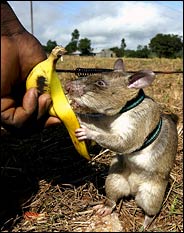The New York Times : The Gambian giant pouched rat ...... may be as good a mine detector as man or nature has yet devised.
Just after sunup on one dewy morning, on a football field-sized patch of earth in the Mozambican countryside, Frank Weetjens and his squad of 16 giant pouched rats are proving it. Outfitted in tiny harnesses and hitched to 10-yard clotheslines, their footlong tails whipping to and fro, the rats lope up and down the lines, whiskers twitching, noses tasting the air.
Wanjiro, a sleek 2-year-old female in a bright red harness, pauses halfway down the line, sniffs, turns back, then sniffs again. She gives the red clay a decisive scratch with both forepaws. Her trainer, Kassim Mgaza, snaps a metal clicker twice, and Wanjiro waddles to him for her reward — a mouthful of banana and an affectionate pet.
"What Pavlov did with his dogs is exactly what we're doing here — very basic conditioning," said Mr. Weetjens, a lanky, 42-year-old Belgian who works for an Antwerp mine-removal group named Apopo. "TNT means food. TNT means clicking sound, means food. That's how we communicate with them."
Wanjiro was rewarded for sniffing out a TNT-filled land mine, one of scores buried a few inches below ground in the training field where she works out five days a week. Like all the training mines, this one was defused. But if the Mozambican authorities approve, she and her companions will move at year's end from dummies to live minefields — the world's first certified, professional mine-detecting rats.
Just after sunup on one dewy morning, on a football field-sized patch of earth in the Mozambican countryside, Frank Weetjens and his squad of 16 giant pouched rats are proving it. Outfitted in tiny harnesses and hitched to 10-yard clotheslines, their footlong tails whipping to and fro, the rats lope up and down the lines, whiskers twitching, noses tasting the air.
Wanjiro, a sleek 2-year-old female in a bright red harness, pauses halfway down the line, sniffs, turns back, then sniffs again. She gives the red clay a decisive scratch with both forepaws. Her trainer, Kassim Mgaza, snaps a metal clicker twice, and Wanjiro waddles to him for her reward — a mouthful of banana and an affectionate pet.

"What Pavlov did with his dogs is exactly what we're doing here — very basic conditioning," said Mr. Weetjens, a lanky, 42-year-old Belgian who works for an Antwerp mine-removal group named Apopo. "TNT means food. TNT means clicking sound, means food. That's how we communicate with them."
Wanjiro was rewarded for sniffing out a TNT-filled land mine, one of scores buried a few inches below ground in the training field where she works out five days a week. Like all the training mines, this one was defused. But if the Mozambican authorities approve, she and her companions will move at year's end from dummies to live minefields — the world's first certified, professional mine-detecting rats.
Comments